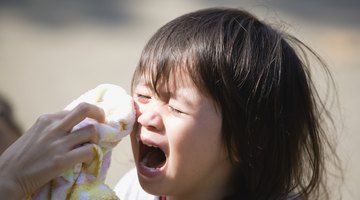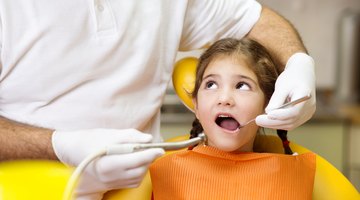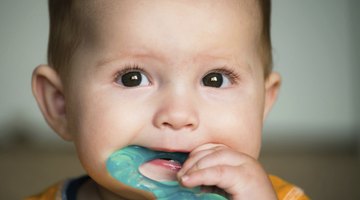Can a Child Get Fever From Cutting Adult Teeth?
By the age of 3, your child usually has all of his primary or baby teeth. At the age of about 6 years or so, these begin to exfoliate and the permanent or adult teeth start to come in. This process can go on for as long as the child is 21 years or older.
Symptoms Associated With Teething
A child can exhibit a lot of symptoms or none at all while teething. Not all children are affected to the same degree. Some tell-tale symptoms of teething are biting everything in sight, decreased appetite for solid foods, rubbing the gums or pushing at them, sucking, increased irritability, ear-rubbing, drooling nonstop, chin or facial rash, wakefulness and mild fever. Fever is the one symptom that often leaves parents wondering what to do.
Fever and Teething Issues

Teething & Screaming in Infants
Learn More
According to a prospective study conducted by the Departments of Pediatrics and Adolescent Medicine at the Cleveland Clinic Foundation, mild fever has been statistically associated with teething. They also concluded that high fever of above 102 degrees Fahrenheit was not attributable to teething. These findings are a result of studying 475 tooth eruptions in children. The American Academy of Pediatrics advises parents that any fever above 100.4 degrees Fahrenheit should be investigated to rule out any bacterial source of infection.
OTC Pain Remedies
A low-grade fever most likely will go away when the tooth has erupted. Consider medicinal treatment only if the child seems uncomfortable or if it is affecting his daily routine to a great extent. Over-the-counter acetaminophen or ibuprofen are effective remedies for pain, as well as for fever.
When to Worry

How Long Does it Take for a Baby to Cut Molars?
Learn More
Medication can be effective but should only be used occasionally and under the direction of a doctor. Exercise caution while administering any medication to a child. Ensure that the medicine has not expired, make sure you know the correct dosage for your child's weight and age and read the labels twice to be sure you are giving them the right one. Do not give a child under 19 aspirin ,due to the risk of Reye's syndrome and an increased risk of bleeding.
If your child has a fever above 101.4 degrees Fahrenheit, take her to the doctor. Make sure that you have noted which route you used to take the temperature -- oral, rectal, underarm or forehead, because each route has a different range of normal temperatures. If your child is less than 3 months old, call the doctor if there is any elevation of temperature. If there are any other severe symptoms other than a mild fever, such as diarrhea, vomiting, ear pain, extreme irritability or lethargy, take the child in to see the doctor.











